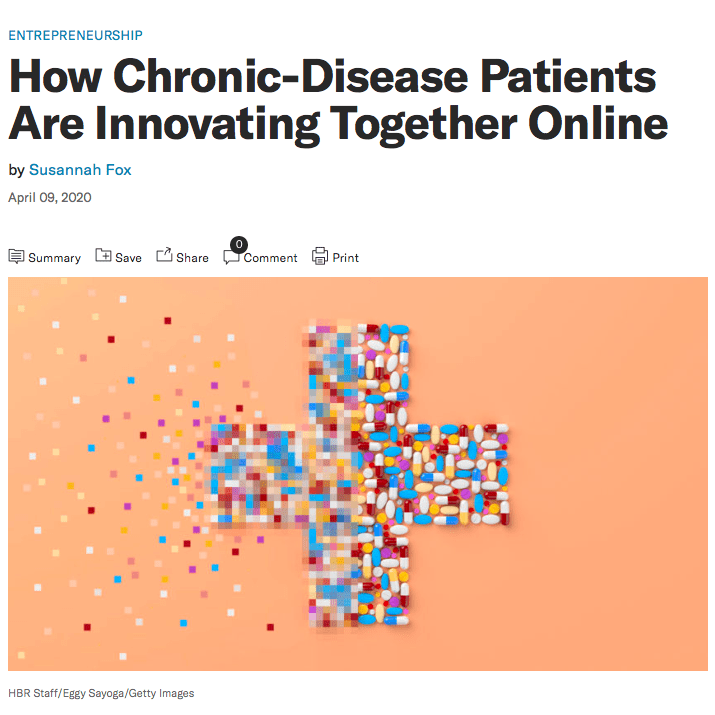
I am thrilled to share this excerpt from the Harvard Business Review article I wrote, “How Chronic-Disease Patients Are Innovating Together Online”:
The internet gives us virtually unlimited access to each other. That deceptively simple insight is an untapped opportunity in health care. When companies are searching for their next idea, they should look to the online communities of patients who are working to solve their health care challenges on their own.
Young people lead the way: 51% of U.S. adults ages 18 to 22 years old say they have looked online for people with health concerns similar to their own. Eight in ten were successful, mostly finding each other through search, YouTube, and other social platforms. And when asked to think about the most recent time they found health peers online, 91% of young adults said it was helpful. The benefits of such connection seem intuitively obvious and have been confirmed in academic studies. Yet, as I’ve seen in my work both in the private sector and as a former chief technology officer in the U.S. Department of Health and Human Services, peer-to-peer health networks are largely being ignored by businesses and even most clinicians. These are satisfied customers for a product that nobody is selling – yet.
The full text is available to non-subscribers as long as you have not yet exceeded your limit of free articles.
A few thank-you notes:
- Dana Lewis & Christopher Snider were kind enough to read drafts. All errors are mine, of course.
- Vicky Rideout was my co-author on the study I cite about young adults finding health peers online (shout-out to Hopelab and Well Being Trust for sponsoring the work!)
- The editorial team at Harvard Business Review, particularly Gardiner Morse, sharpened and clarified my prose. And how much do I love that they put the article in the Entrepreneurship category? Answer: A lot.
OK, open thread: I’d love to hear what you think about how I described the opportunities of peer-to-peer health care for business leaders and entrepreneurs.
In sharing the HBR article with colleagues, I’ve been getting some great questions. Here’s one: What are some examples of companies or organizations supporting peer to peer health activity?
Here’s what I wrote back (and note that I had to leave out a lot of examples — if I didn’t name your favorite, please add it in the comments below):
There are many platforms for connection (stage one of peer-to-peer health). To name a few:
– Inspire.com (chronic disease management)
– SmartPatients.com (chronic disease management)
– Facebook groups
– Twitter hashtags for certain conditions (like #bcsm for breast cancer)
There are a few platforms for connection (stage one) and small scale problem-solving (stage two):
– Patient Innovation (assistive device design)
– InquisitHealth (one on one peer coaching for chronic conditions)
– I know of others that are built to solve specific problems like clinical trial recruitment; finding a clinician; fitness goal-setting & behavior change; clinical quality improvement… But they are tiny startups at this point.
Not very many platforms are making the leap to scale with an infusion of resources (stage three) but I have high hopes for:
– PatientsLikeMe (chronic condition management and treatment discovery; acquired last year by UnitedHealth)
– Iodine.com (drug info; acquired by GoodRx)
OK, I feel like I’ve opened a can of worms by posting this, but I’m curious: What do you think?